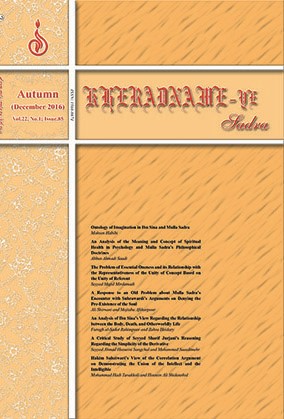An Analysis of Ibn Sina’s View Regarding the Relationship between the Body, Death, and Otherworldly Life
Subject Areas :Furugh al-Sadat Rahimpoor 1 , Zahra Heidary Heidary 2
1 -
2 -
Keywords: Body moral habits Death otherworldly life Ibn Sina,
Abstract :
There is no doubt about the co-existence of the body and the soul in worldly life. However, there are some debates on the accompaniment of worldly body and the soul in other worldly life. Based on Ibn Sina’s principles, worldly life cannot have an otherworldly life; however, some effects of the worldly life of the body stay with the soul until eternity and affect Man’s otherworldly and eternal life. In Ibn Sina’s view, the body plays an essential role in the occurrence of death. This is because its change and annihilation are the reasons behind the separation of the soul from the body and, as a result, the end of worldly life. Upon the beginning of the otherworldly stage of life, the unity of the soul with the material body is ruptured; however, the effects of some of the worldly acts and behaviors of the body are not destroyed and, rather, affect the quality of the final destiny of human beings and their lives in some way. The actualization of complete connection with the Active Intellect, which becomes possible through overcoming all physical barriers and limitations and the true perception of spiritual pleasures and the essence of the soul are among such effects. The behaviors rooted in the bodily configurations that have penetrated the soul remain until the next life and play a role in providing the context for the happiness and misery of the soul and determining the quantity and quality of its otherworldly rewards and punishments.
ابنسينا، الاشارات والتنبيهات، قم، دفتر نشر كتاب، 1379.#
ابنسينا، التعليقات، حققه و قدّم له الدكتور عبدالرحمن بدوي، قم، مكتب الاعلام الاسلامي، 1404ق.#
ابنسينا، الشفا ـ الالهيات، راجعه و قدم له الدكتور ابراهيم مدكور، تهران، انتشارات ناصرخسرو، 1960م.#
ابنسينا، المبدا والمعاد، باهتمام عبدالله نوراني، تهران، مؤسسة مطالعات اسلامي دانشگاه مك گيل، 1363.#
ابنسينا، النجاة من الغرق في بحر الضلالات، ويرايش و ديباچه محمد تقي دانشپژوه، تهران، انتشارات دانشگاه تهران، 1364.#
ابنسينا، النفس من كتاب الشفا، تحقيق آيت الله حسنزاده آملي، قم، بوستان كتاب، 1375.#
ابنسينا، الهيات شفا، ويرايش و ترجمه ابراهيم دادجو، تهران، انتشارات امير كبير، 1390.#
ابنسينا، الهيات نجات، ترجمه و شرح يحيي يثربي، قم، بوستان كتاب، 1385.#
ابنسينا، دانشنامة علايي (الهيات)، تصحيح و تحشيه احمد خراساني، تهران، چاپخانه مركزي، 1315.
ابنسينا، رسائل ابن سينا، قم، انتشارات بيدار، 1400ق.#
ابنسينا، رسالة احوال النفس، حققه و قدّم اليه احمد فواد الاهواني، قاهره، دار احياء الكتب العربيه، 1952م.#
ابنسينا، رسالة في معرفة النفس الناطقه و احوالها (ضميمه احوال النفس)، احمد فواد الاهواني، قاهره، دار احياء الكتب العربيه، 1952م.#
ابنسينا، روانشناسي شفا (ترجمه فن ششم از كتاب شفا)، به قلم اكبر دانا سرشت، بيجا، بينا، 1318.#
ابنسينا، طبيعيات دانشنامه علايي، با مقدمه و حواشي و تصحيح سيد محمد مشكوه، تهران، انتشارات انجمن آثار ملي، 1331.#
ابنسينا، فنون سماع طبيعي از كتاب شفا، ترجمه و نگارش محمد علي فروغي، تهران، چاپخانه بانك ملي ايران، 1319.#
ابنسينا، قانون در طب، ترجمه عبدالرحمن شرفكندي، تهران، انتشارات سروش، 1363.#
ابنسينا، مبحث عن القوي النفسانيه (ضميمة احوال النفس)، احمد فواد الاهواني، قاهره، دار احياء الكتب العربيه، 1952م.#
ابنسينا، مجموعه رسائل فارسي ابنسينا، تصحيح و توضيح سيد محمود طاهري، قم، انتشارات آيت اشراق، 1388.#
ابنسينا، معراج نامه، مقدمه و تصحيح و تعليق نجيب مايل هروي، مشهد، بنياد پژوهشهاي اسلامي آستان قدس رضوي، 1365.#
بهشتي، احمد، تجريد، قم، بوستان كتاب، 1385.#
داوودي، عليمراد، عقل در حكمت مشاء، تهران، انتشارات حكمت، 1387.#
معين، محمد، فرهنگ فارسي معين، تهران، نشر سرايش، 1380.#


